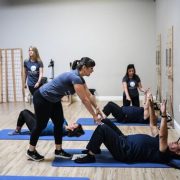5 Benefits of Adding Pilates to Your Fitness Routine
5 Benefits of Adding Pilates to Your Fitness Routine
Pilates has been around for about 100 years, and it still amazes me how many people have NOT heard of this incredible exercise method.
If you didn’t already know – it was first created by Joseph Pilates and initially gained popularity among the dance community as a way to recover from and prevent injuries. But you don’t have to be a dancer to practice Pilates or enjoy the benefits. It has become increasingly popular for the over 50 crowd – and for good reason…
Unlike what’s often touted in the media, the benefits of a regular Pilates practice go way beyond a lean beach body and 6-pack abs.
For Mr. Pilates, his method was created out of a quest to improve his overall health in a holistic way that went beyond what could be achieved with traditional strength-training methods. He suffered from various health ailments – and thanks to his incessant curiosity and fascination of the human body and what it was capable of – he eventually came up with his transformational method of total body conditioning.
Personally, I’ve been incorporating Pilates into my own work as a physical therapist for over 10 years, and I practice Pilates myself weekly. I love and believe in it so much that I’ve designed my entire business model around it!
Pilates is a full body strengthening system that emphasizes breath, precision, coordination, and core strength.
The better you can understand and connect to your body, the easier it is to prevent injury and push your body to limits you otherwise may not have thought possible.
Here are 5 Benefits of Adding Pilates to Your Fitness Routine – and why you should consider adding a regular Pilates practice to YOUR fitness routine as well…
1. Pilates helps with back pain.
Once you hit 40, your risk of back injury starts to climb, and a regular practice of Pilates is a safe and sustainable way to help keep your back pain-free and strong. Pilates focuses on core strength but is also a well-balanced exercise system. Full body strength and balance is a critical component for life-long back health – something that isn’t always addressed in traditional back pain rehabilitation programs or strength-training regimens. We even have specific Pilates classes geared towards people with back pain!
2. Pilates strengthens your whole body – not just your core.
Pilates is known as the staple of core training – but it doesn’t just stop there. Pilates strengthens your arms, glutes, hips, and legs in a way that helps them to not only be strong – but work together in a balanced and coordinated fashion. I call this “balanced strength” – and it’s one of the keys to truly enhancing your fitness and performance levels.
3. Pilates improves your flexibility and mobility.
People use these terms synonymously but they are actually quite different. Flexibility refers to muscle length and pliability. Mobility refers to joint range of motion. Flexibility without mobility is useless – and you need a balance of strength and flexibility to optimize mobility. In other words – a balanced joint – one that is strong and flexible – allows the joint to move fully and freely – which optimizes its mobility. Pilates emphasizes continuous, slow, and precise movements through a large range of mobility. This allows you to work on both strength and flexibility simultaneously – and thus – your mobility as well.
4. Pilates puts minimal stress on your joints.
Aging is a real thing and along with it comes arthritis. The key to combating arthritis is optimizing the area around the affected joint or joints. When you have good mobility, and balanced strength, you have less compressive forces on your joints. Arthritis doesn’t like compressed, crowded joints. So when you strengthen and stretch your whole body in a good, balanced way – arthritis becomes less painful and stiff. Pilates helps with all this while not causing any added stress on your joints in the meantime.
5. Pilates trains your nervous system.
Your nervous system is responsible for conducting messages from your brain to your muscles. If that’s not in-tune – you could develop compensations and inefficient movement patterns that eventually lead to pain and injury. Pilates emphasizes precise and coordinated movements, which enhances and reinforces this brain to muscle connection. You can’t just go through the motions when you do Pilates. You have to use your brain and really concentrate on what you’re doing. This helps to train your nervous system – resulting in smoother, more coordinated movements – and better balance as well.
Are you interested in learning more about pilates and seeing if it’s a good fit for you?
Dr. Carrie Jose, Physical Therapist and Pilates expert, owns CJ Physical Therapy & Pilates in Portsmouth and writes for Seacoast Media Group.


